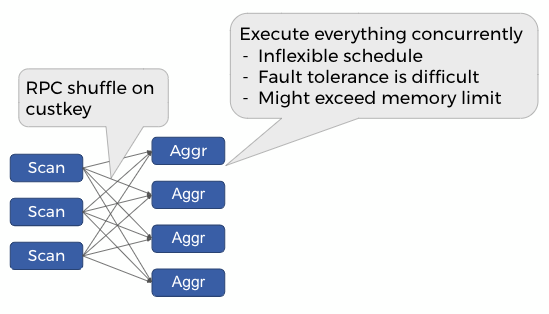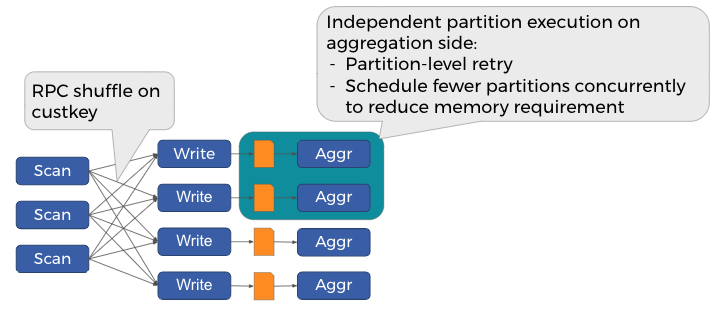Exchange Materialization#
Presto allows exchange materialization to support memory intensive queries. This mechanism brings MapReduce-style execution to Presto’s MPP architecture runtime, and can be applied together with Spill to Disk.
Introduction#
As with other MPP databases, Presto leverages RPC shuffle to achieve efficient and low-latency query execution for join and aggregation. However, RPC shuffle also requires all the producers and consumers to be executed concurrently until the query is finished.
To illustrates this, consider the aggregation query:
SELECT custkey, SUM(totalprice)
FROM orders
GROUP BY custkey
The following figure demonstrates how this query executes in Presto classic mode:

With exchange materialization, the intermediate shuffle data is written to disk (currently, it is always a temporary Hive bucketed table). This opens the opportunity for flexible scheduling policies on the aggregation side, as only a subset of aggregation data needs to be held in memory at the same time – this execution strategy is called “grouped execution” in Presto.

Using Exchange Materialization#
Exchange materialization can be enabled on per-query basis by setting the following 3 session properties:
exchange_materialization_strategy, partitioning_provider_catalog and hash_partition_count:
SET SESSION exchange_materialization_strategy='ALL';
-- Set partitioning_provider_catalog to the Hive connector catalog
SET SESSION partitioning_provider_catalog='hive';
-- We recommend setting hash_partition_count to be at least 5X-10X about the cluster size
-- when exchange materialization is enabled.
SET SESSION hash_partition_count = 4096;
To make it easy for user to use exchange materialization, the admin can leverage Session Property Managers
to set the session properties automatically based on client tags. The example in Session Property Managers
demonstrates how to automatically enable exchange materialization for queries with high_mem_etl tag.